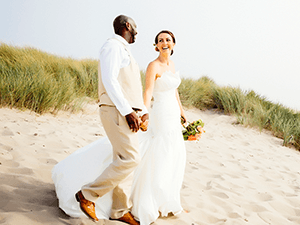The Art of Planning and Budgeting for Your Wedding
Hello, wedding season!
Did you know 73% of weddings take place between May and October? The most popular wedding month is October, followed by September and June.

No matter when you’re getting married, planning for one of the biggest milestones in your life can be stressful — and expensive. No matter if you have $5,000, $50,000, or $100,000 to spend on your wedding, you should always start with a budget.
Setting a budget early on and knowing the limit of what you can spend will help you sort out venues that are out of your budget. Make sure you discuss with your partner what types of things you are looking for when it comes to food, décor, entertainment and overall experience, or you’ll run the risk of getting caught up during on-site venue visits. You may even end up adding on things you might not have wanted in the first place!
I spoke with two Service Credit Union employees with upcoming weddings to get their top tips when it comes to planning and budgeting for a wedding.
Chris Banker – Marketing Communications Specialist
Engaged since Sept 2019, getting married Sept 2021
Dave Dwyer – Marketing Field Representative
Engaged Feb 2021, getting married September 2022
What did you do to financially prepare for your wedding?
Chris: One of the biggest things my fiancé and I did was set a budget early on before looking at venues. It was important for us to figure out a window of how much we wanted to spend, where the money was going to come from, if it was going to come out of our personal savings, and if family would be helping with costs. It also helped us narrow down our list of venues because there were some that we loved but their cost did not fit within the budget that we set.
Dave: We considered what each of our families were contributing and we calculated what we could save now and until the day of the wedding. We thoroughly looked at our expenses and set a budget. We also put any bonuses or any cash gifts we got from birthdays and other celebrations toward our wedding fund. The most important thing here is setting a budget. You need to know approximately what your wedding budget is because there can be venues that are $2,000 to reserve an area and other venues that charge up towards $20,000 and more just to walk through the doors, not including all the add-ons.
Did you know some venues offer lower prices if you opt into booking a Friday or Sunday wedding?
What are some smart financial tips when it comes to wedding planning?
Chris: We knew we wanted to come out of the wedding debt free so we reserved a ton of money for the wedding and had a calendar of when payments were due to stay on top of it.
Dave: We ended up setting our budget way lower than originally planned. What we found when going on wedding venue visits was that banquet halls were significantly more affordable compared to traditional sites that only do weddings. We found that the banquet hall that we picked was more reasonable and there was a lot more included in it because they do things like proms, graduations, bar mitzvahs, etc. It’s not a wedding venue but it’s a good comparison.
Did you know that 74% of couples end up going over budget?
How do you stay financially sound while planning a wedding?
Chris: A good way to stay financially sound is to always keep your budget in mind. When you keep that final number in mind, it can help you stay on track of your budget because you might be tempted to spend a little extra in entertainment but then you won’t have that money for party favors for guests or honeymoon costs.
Dave: Luckily the venue that we chose, the base package included almost everything except entertainment, flowers, cake, and an open bar. Another thing that we looked into was DIY décor such as doing our place settings.
Do you have any tips and tricks for newly engaged couples when planning a wedding?
Chris: Find online tools, such as popular wedding sites The Knot, Wedding Wire, or Zola as they have a wedding budget by category. Talk to different vendors to get more options in front of you and ask friends and family for planning advice! The stress can be overwhelming because it’s one of the most expensive things you’re going to pay for. So enjoy the process and keep an open mind.
Dave: It only comes once so have fun with it, communicate with your partner, and remind yourself you’re creating something! While getting married and throwing a wedding is an important milestone in one’s life, starting off on the right financial footing will truly help contribute to your happily ever after!
